If you’re thinking of living in Tahiti and need guidance on whether you should do it or not, this is your helpful guide.
Tahiti is a beautiful island in the South Pacific that was formed thousands of years ago due to deep-sea volcanic activity. It’s part of French Polynesia under the Society Islands and is recognized as the biggest and central island in French Polynesia.
All international flights arrive in Tahiti because it has the only international airport in French Polynesia. For many travelers, Tahiti acts as a transit point. They arrive here, spend a night, and then continue to other more touristy islands like Bora Bora or Moorea.
However, Tahiti is more than just that, with the mesmerizing turquoise lagoons and lush green mountains to the warm hospitality of the Tahitian people, there’s a lot to discover and embrace.
Down below, I’ve shared key insights and all the pros and cons of living in Tahiti to help you in making a well-informed decision.
What’s it like to live in Tahiti?
Living in Tahiti means being close to nature and breathing clean, fresh air. Life here is simple and moves at a relaxed pace. The locals are generally friendly and welcoming. The island is abundant in scenery with beautiful landscapes and black sand beaches.
Many people think that Tahiti is always rainy, which is not entirely true. Rainfall varies throughout the year, with some months having more rain than others. And the same goes for the hot and humid weather.
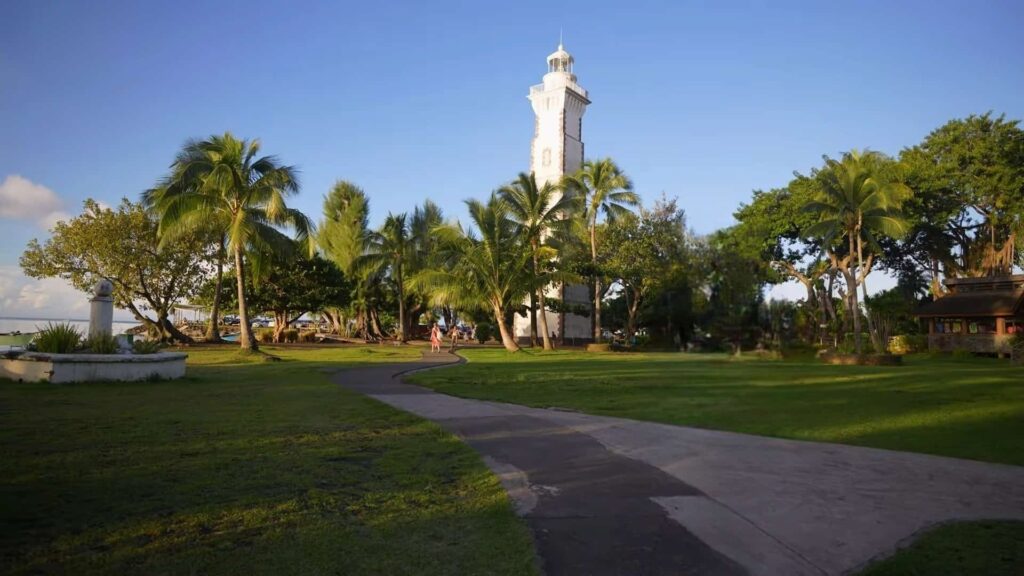
On Tahiti, you can experience both rural and urban environments. The north side of the island where Papeete (capital city of French Polynesia) is situated, is more built-up and urban. Whereas the rest of the island is rural and laid back.
Tahiti Cost of Living
Living on Tahiti Island is no way cheap. The cost of living for individuals can range between $1000 and $2000 per month. For couples or families, it can be around $2000-$5000 a month, depending on spending habits.
It’s true that life in Tahiti is expensive but it’s important to remember that it is an island. Most of the things are imported here, plus higher customs duties in addition to import costs increase the overall cost of the goods.
However, if you’re from the US or have lived in a touristy spot, you’ll find that Tahiti is not that expensive. Except for a few items, the prices of most goods on the island are comparable to that of other tourist destinations.
The issue is for those locals living in French Polynesia because people here don’t earn much. This is why locals often express their discontent with the high prices, let alone tourists.
Due to high prices and low income, about half of the population in French Polynesia lives below poverty line. The average monthly income of a French Polynesian is $1317, with a quarter of the population earning no more than $600 a month.
Transportation cost
Transportation in Tahiti is expensive. A taxi usually costs $20-$25 for a 5 km (3 miles) trip. However, rental cars in Tahiti are a bit more affordable, and renting one will cost around $50 to $350 per day, depending on the type of vehicle you choose.
If you decide to keep the vehicle for the long term, you can actually get a vehicle for as little as $1000 a month, and that’s a pretty good discount compared to the daily rental rates.
Scooters are also quite popular on the island as they are easier to get around the city. Renting one for a day usually costs up to $50. If renting for the long term, you can negotiate the price and possibly get a discount.
Fuel/Gas
Fuel is also costly in Tahiti due to high taxes. The price of a liter of petrol is around US$1.7 and is fixed by the government.
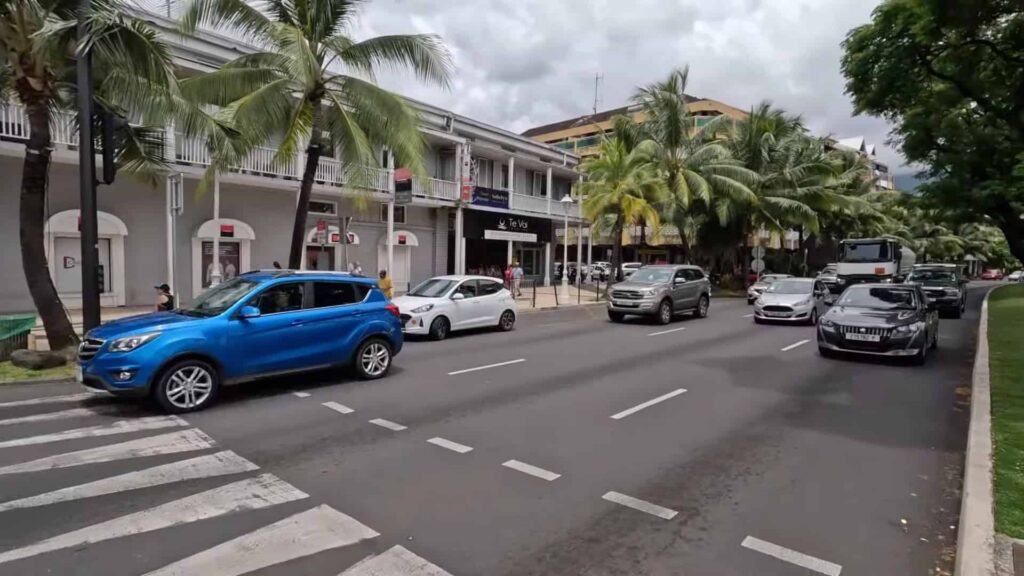
Healthcare cost
One of the main benefits of living in Tahiti is that public healthcare is free. Locals enjoy this benefit due to government subsidies for the social welfare system. Sadly, expats & foreigners have to pay, and it usually costs around $25 to $35 for a private consultation.
Although healthcare for foreigners is quite expensive, it’s not that expensive when compared to France or US.
Moreover, common medicines and antibiotics are cheap and readily available on the island.
Education cost
The government finances the public schools, making education in Tahiti free. Private schools are mostly run by churches and get subsidies, so they’re not expensive either. Higher education is also affordable and costs as little as $9 a year.
The bad part is only locals can enjoy these educational perks. Non-residents, on the other hand, are required to pay, with higher education costing a minimum of $1000 annually.
Cost of housing
Accommodation prices in Tahiti are moderately high. Renting a single room can cost around $800 a month, but prices can go up to $3000 depending on the location and the size/type of accommodation.
You can also get a discount if you plan to stay longer than a week or a month, so don’t forget to discuss this when booking.
Additionally, if you want to buy a property on the island, be ready for high prices. A typical one-bedroom apartment can cost well over $100,000, and the prices can go above a million dollars depending on the size and location of the apartment or villa.
For renting or buying, you can visit Petites announces which is the local website for buying & selling various items.
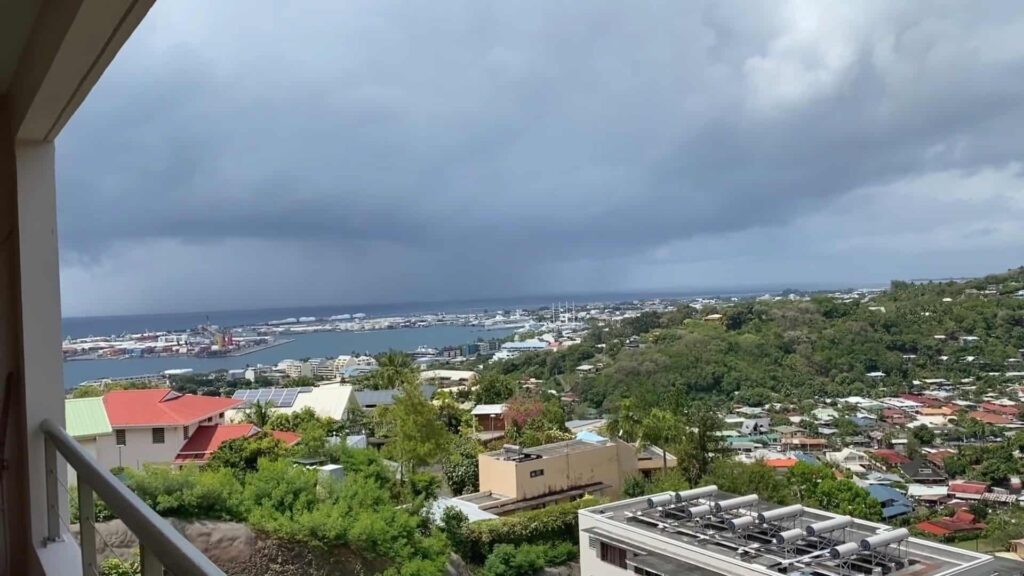
Utility cost
The average cost of utilities in Tahiti including electricity, internet, and water is around $200-$300 per month. This cost may increase or decrease depending on usage.
Electricity
In Tahiti, the electricity bill for one bedroom without AC can cost between $15 & $30 per month. For a proper house with multiple rooms, expect to pay around $100 per month. If you have power-consuming appliances like AC, the cost can go up a lot.
Internet
Unlimited home internet with a decent speed on Tahiti can cost around $80 per month. If you choose pocket Wi-Fi or mobile phone data instead, it will cost the same as home internet but you won’t have unlimited data.
Water
In Papeete, you get the water bill every 3 months, and it’s usually around $30-$50. Tap water is also drinkable in most parts of Tahiti. However, bottled water on the island is a bit pricey and costs around $5 for 1.5L.
Groceries & food cost in Tahiti
Food prices in Tahiti are high because about 82% of food items are imported in French Polynesia. Food is the biggest expense for locals and affects the cost of living in Tahiti.
An average dine-out costs around $20 per person. But if you’re cooking at home and living like a local, your monthly food expense will be somewhere between $400 and $800.
If you’re a tourist or expat looking to save on food expenses, I’d suggest eating what & where the locals eat and cooking meals at home. There are plenty of affordable and delicious options at local food places like shacks and food trucks.
While food and groceries can be pricey, they’re not incredibly expensive when compared to overall high costs on the island. If you’re living in Tahiti as an American, you’ll find that prices are almost the same as in the US and some items are even cheaper.
The French government subsidizes essential food items like milk, eggs, baguettes, flour etc. Additionally, locally grown fruits, vegetables, and other subsidized foods are quite affordable.
Papeete Market and Carrefour supermarket in Tahiti are popular spots for grocery shoping, where almost everything is available that you could find on the mainland.

Things to Know About Living in Tahiti
1. French is the language
French is the official language in French Polynesia, and it’s commonly spoken by locals in Tahiti. There is also use of Tahitian which is a Polynesian language, but it’s usually spoken by the elderly and within households, and is considered as a secondary language.
Before the arrival of French, islanders primarily spoke Tahitian as their mother tongue. Some people think that the Tahitian and French are same, but they’re not. Although Tahitian has some words that may sound similar, overall it’s a different language and harder to learn than French.
If you don’t speak or understand French or Tahitian, you’ll find it difficult to communicate with others in everyday matters. According to the 2017 census, over 73% of Polynesian population speak French and about 20% speak Tahitian at home.
But times are changing, as with the internet and advancement in Tahiti, many young Polynesians can speak English now. It also depends on the area where you are staying and the places you are visiting.
Papeete is somewhat better as about 40-50% population here can understand English. At most hotels, resorts, restaurants, and shops, communication is better. Moreover, you’ll also run into other expats in Tahiti who speak English, and it’s always nice chatting with them.
The locals try to go out of their way to help but the language barrier is definitely an issue. You’ll need to pick up some French if you intend to stay in Tahiti for a while.
2. Hot and humid climate
Tahiti experiences a warm tropical climate with average temperatures around 70-90 degrees Fahrenheit. Humidity is always high with an average percentage between 80 and 90.
Sun is next level in Tahiti or should I say all of French Polynesia. Being in the tropics, Tahiti gets a lot of direct sunlight, which means the heat can be intense.
When walking around the town, you’ll definitely be sweating on a sunny day. It’s necessary to apply sunscreen and also have sunglasses with you. Even if the sun is behind clouds, you’ll still feel heat and humidity. Living here without a fan or air conditioning is pretty much impossible.
Moreover, Tahiti receives trade winds throughout the year that help cool things down a bit. Sometimes the air pressure is so heavy that if you’re running or biking, you feel like a force pushing against you.
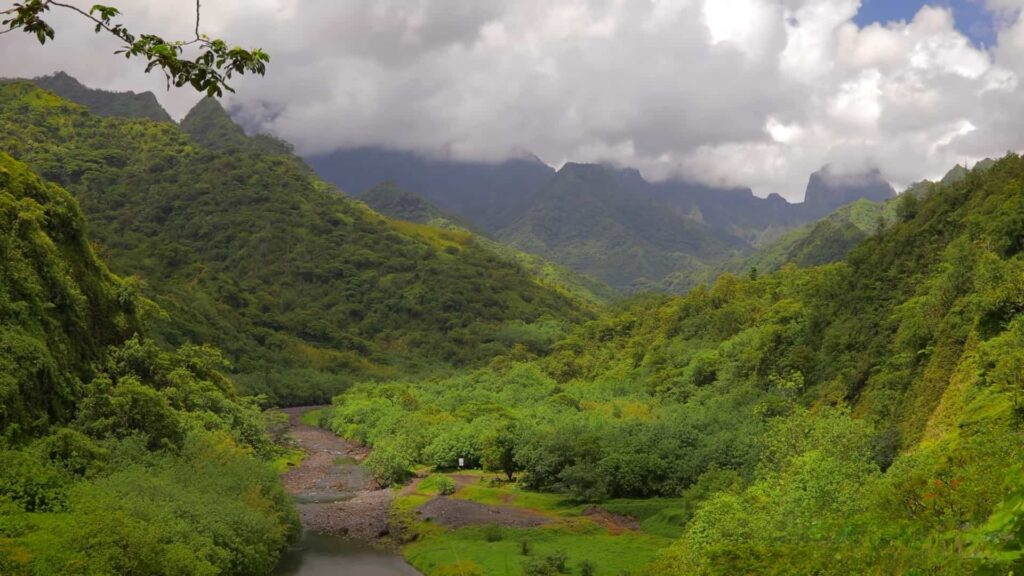
3. Unpredictable weather
The weather in Tahiti can change very quickly. One moment there is sunshine, and the next, there’s a downpour. Sudden showers are common but they usually last only 10 minutes.
There are times when it can rain for days which can limit activities on the island. But this doesn’t make this island uninhabitable.
There are only summer and winter seasons in Tahiti. To describe them in one sentence, I’d say it’s either rainy or not so rainy, and hot or not so hot.
Wet season is actually the summer season that lasts from November to April. As humidity and temperatures increase in this season, so does the rainfall.
The benefit of frequent rain during the wet season is that it helps dampen the heat and humidity. However, the downside is that sometimes there’s just too much of it.
The dry season happens in the winter from May to October. This is the time when rain probability falls and weather becomes less hot, resulting in a pleasant atmosphere.
4. Expensive housing
Being a tourist place, housing in Tahiti is expensive. There are plenty of options available on the island for whatever budget you have. You can buy an apartment, penthouse, villa, or single-family house. Prices totally depend on the location and the property you’re interested in buying or renting.
If living in Papeete City, you’ve more options, but the prices are high in that area. As you move away from the city, prices gradually drop but the options become limited as well.
Not only property prices are high, but it’s also difficult for foreigners or overseas to buy property on the island. In 2022, the government tried to impose 1000% real estate tax for non-residents. Although the amendment bill was suspended later, but you never know what may happen in the future.
Moreover, for French citizens and to some extent European citizens, it’s easier to buy property in French Polynesia and requires less documentation than other nationals.
So, I’d say it’s actually better to rent than buy as it’s affordable and involves less hassle unless you’re moving to Tahiti for good or investing as a realtor.
Polynesian homes
In addition to modern apartments and concrete houses, you’ll come across houses built on stilts. These houses have a more traditional and cultural feel, often called “Fare” in Polynesia.
These houses feature wooden structures and walls with bamboo or tin roofs. They are designed to be open and airy and elevated on stilts to protect them from flooding.
It’s also common for Tahitians to leave their house windows and doors open, even when they aren’t at home. They only close them when they’re going out for the extended period. Additionally, houses typically have backyards with many vegetables and fruits planted.
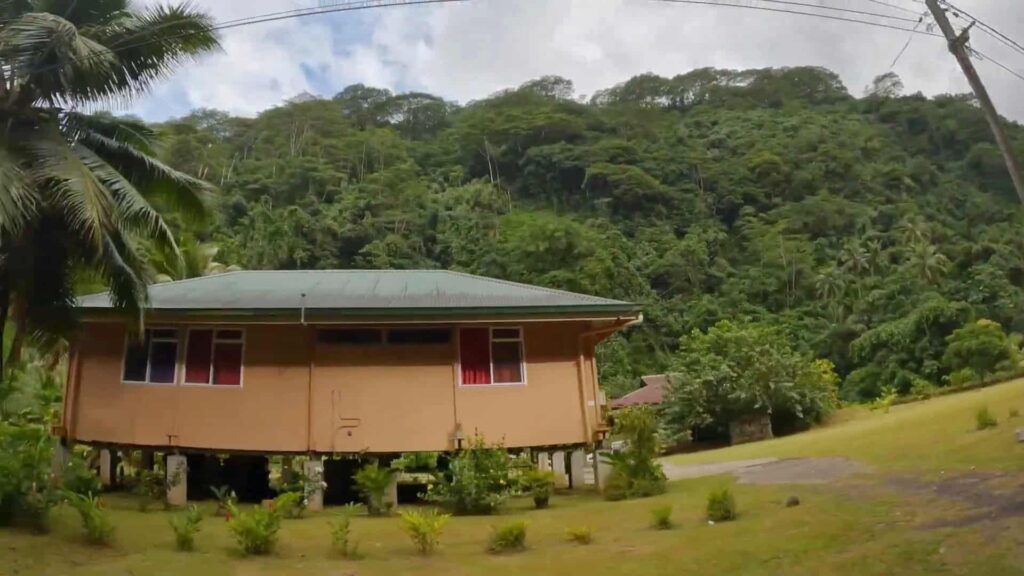
5. Good healthcare system
Following the high standards of France, the Healthcare system in Tahiti is also well established. There are public and private hospitals and clinics on the island where you can receive treatment for any medical need. The majority of doctors are trained either in France or other countries with comparable standards.
Taaone Hospital is the major public hospital in Tahiti and across French Polynesia, equipped with modern infrastructure and medical professionals from various fields. This hospital not only serves the people of Tahiti but also those from other outlying islands.
While this hospital is a big name in Tahiti, it does have some limitations when it comes to highly specialized care. And for that, you’ll need to travel outside French Polynesia.
Furthermore, there are many clinics on the island where you can receive specialized treatment from different doctors. Usually, these clinics are located next to pharmacies.
Keep in mind that private pharmacies are not allowed to give medicines/drugs without a doctor’s prescription. If you’re a tourist, you can simply show your doctor’s prescription over the phone.
6. Moderate transportation system
Transportation in Tahiti isn’t the best. While there are various options like renting a car or scooter or booking a taxi. Public transport is also available on the island, which uses a bus system but you can’t rely on it, you just never know when the bus is going to come.
So, your best options to get around Tahiti are renting a car or scooter, or hiring a taxi. For long-term stays in Tahiti, it’d be worth considering purchasing one.
Tahiti isn’t a big island, normally it takes about 2 hours to drive around it. There’s just one main road (highway) that loops around the entire island, with several small roads branching off from it.
The roads in Papeete and throughout the island are in good condition. There is little to no traffic jams, though it can get busy, particularly in downtown Papeete during morning and evening rush hours.

7. Compulsory education system
Although Tahiti is an island, its education system is well-established and quite similar to France’s. In French Polynesia, it’s mandatory for children between ages 6 and 16 to get formal education.
Parents usually send their children to primary school at the age of 5. They spend 6 years there until moved to secondary school for another 5 years of education. On the island, there are primary, secondary, and tertiary education available along with vocational trainings to make locals skillful.
Tahiti’s only major university is the University of French Polynesia in Papeete, where students can pursue undergraduate and graduate degrees in a variety of subjects.
The literacy rate in Tahiti stands at 98% which is high compared to other islands of French Polynesia. While schooling is compulsory for other islanders as well, dropout rates tend to be higher among them.
8. Tahiti is safe
Tahiti is very much safe by global standards. The serious crime rate in Tahiti is very low, and even petty crimes are minimal. The locals are friendly, and law enforcement on the island ensures that both locals and tourists feel safe.
Even if you come across some sketchy places or people, there’s no need to be alarmed. But this doesn’t mean you shouldn’t take safety precautions. Theft, pickpocketing and snatching cases do happen occasionally, so don’t try to show off and keep your valuables in a safe place.
According to official crime stats, about 54% of crimes in Tahiti are non-violent crimes. This includes crimes like burglaries, shoplifting, brawls, stealing from cars, and some other unarmed thefts.
Non-criminal violence crimes such as assault and homicide are also somewhat common and account for about 11% of crimes on the island.
Moreover, Tahitian men are a bit aggressive in nature, not that they are unfriendly, but sometimes in daily affairs when there’s a bad situation, they are ready to fight.
9. Tahiti is beautiful
Many travelers miss out on Tahiti when traveling to French Polynesia. Apart from its formal side, there’s so much to see.
It’s a beautiful island with lots of greenery and jagged mountains to hike in Tahiti. If tired of city life, you can head to the island’s countryside and soak in the breathtaking scenery or go on adventures like hiking.
Tahiti has stunning black and white sand beaches and crystal clear waters around the island. With that, you can do activities like kayaking, surfing, snorkeling, scuba diving and more.
And if feeling bored in Tahiti, you can hop on a ferry to Moorea, which is just a 30-minute boat ride away. Spend a day there and then back in the evening.
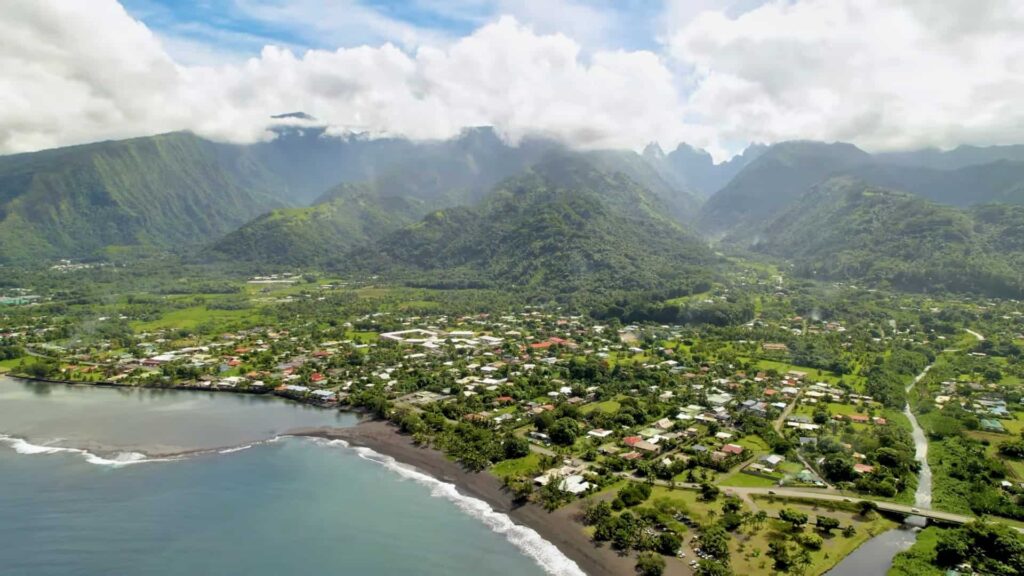
10. Limited jobs
Although there is always a job opportunity on the island of Tahiti, but professional jobs are limited. It’s relatively easy to find work as a salesman, plumber, electrician, attendant, etc., but securing a professional job is hard.
On top of it, if you’re a foreigner or not a French citizen, your chances of getting a job in Tahiti are nearly impossible. Locals are always given priority when it comes to job opportunities. Plus, the government rules have made it very difficult for foreigners to get a job.
If there’s a field or sector where no locals are available for that job, then the chances of a foreigner getting hired for that position are higher.
The French Polynesian economy largely depends on tourism, agriculture, fishing, and household consumption. People in city typically work in the industrial & service sectors and work on jobs that are essentially needed in any city.
Those residing in rural areas mainly do farming and fishing. There are jobs in the agriculture sector as well, usually through private local employers.
Since there are not many jobs available on the island, the unemployment rate is on the rise. This then leads people to crime and other bad stuff.
11. Simple food
Food in Tahiti is a mix of French, Polynesian, and Chinese cultures. Tahitians have lots of carbs and fish in their diet. It’s common to have bread, pasta, mashed potatoes, and other kinds of starches in one meal.
There aren’t many options in food. Although there are plenty of dishes and food choices to try, you might find yourself running out of options if staying in Tahiti for an extended period.
Since most of the Tahitian population is poor, they live off of simple food. There’s lots of use of rice and baguettes because they’re cheap, with government subsidies keeping their prices low.
From the Chinese culture, they use rice with some steak on it. Other Chinese dishes like poulet citron and stir-fry are also popular on the island.
There are also many local Polynesia dishes, and the most famous of them all is “Poisson cru”, which is raw fish with coconut milk. Other dishes include fafaru, po’e, kaveu, firi firi, pua’a roti, breadfruit and all kinds of raw and cooked fish.
Moreover, locals make good use of fish and fruits in their cuisine as they are natural to the island. They also use little to no sugar and get it mostly from fruits.
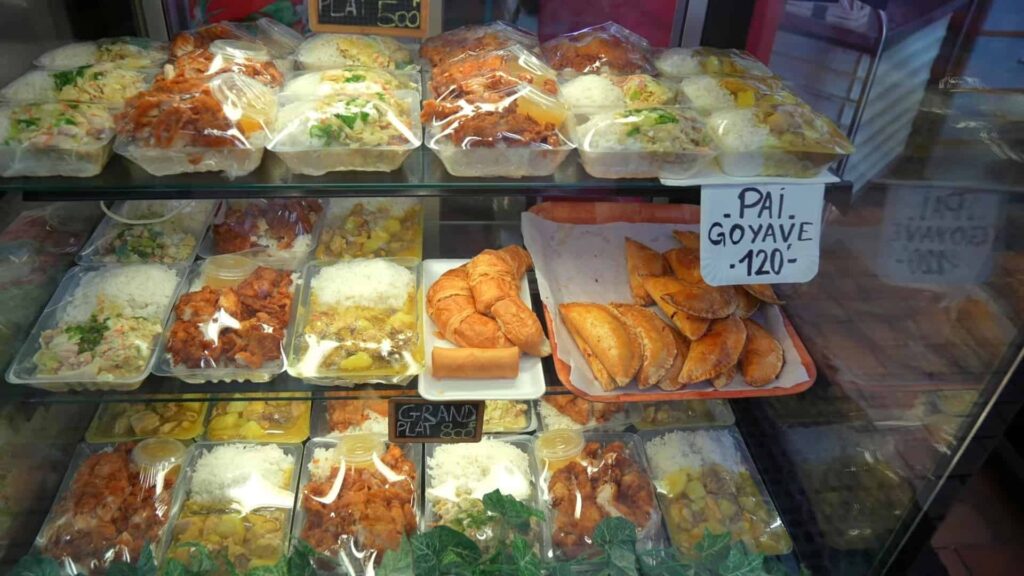
12. No nightlife
In Tahiti, there isn’t a typical nightlife. Most of the island winds down after sunset and comes alive again at sunrise. However, you can experience some nightlife in Papeete downtown where a few bars and restaurants stay open late into the night.
Around 6 pm, most places start to close up, and by 9 pm, there isn’t much to do except for some bars, and restaurants that stay open until 1 pm or 3 pm.
At night in Papeete, you can see a good amount of cars on the roads and there’s some hustle and bustle. But the rest of Tahiti is very much opposite to Papeete and feels like a ghost town.
So going out alone at night is not recommended, especially in the south of the island (Tahiti-Iti), unless it’s really important.
13. People are traditional
Tahitian people value their culture and traditions very much. They are family-oriented and have big families, with multiple family members residing in a big house or several houses on the same street.
It’s common there to greet everyone even if you don’t really know them. They often exchange hugs, cheek kisses, or handshakes as part of their greetings, so don’t hesitate to join in.
Moreover, locals usually eat with their fingers instead of using utensils at the table. It doesn’t mean that they don’t use forks and spoons at all, but using hands is something cultural.
Tahitians are very sensitive people, if you don’t greet them well or make a bad gesture, they can feel it and take it to heart. So whether you are relocating to Tahiti or just visiting, try to fit in and just be nice and friendly to everyone.

14. Laidback environment
If you’re from America or any first-world country, you might feel that there is not any true hustle among locals here. People usually don’t think long-term or should I say plan their future, there’s a common feeling of living in the moment.
People like to sit around, talk, eat, and merry. While doing so, they don’t care about time and their health. There’s plenty of smoking, alcoholism, diabetes and obesity around.
Furthermore, while driving around the island, you’ll also notice that locals drive lazily. Overall, life here is laid-back and just goes on.
However, things are a bit different in the capital city of Papeete. There’s hustle and bustle and you’d see some grind there.
15. Christianity is religion
Tahitians are religious, and almost everyone in Tahiti believes in God. Most of the Tahiti’s population (about 84%) follow Christianity which was introduced in early 18th century when European missionaries were sent here.
There’s a history of religion and beliefs in French Polynesia and you can see the remains of ancient temples and religious sites on the island.
Besides religion, there’s also some existence of suppositious beliefs on the island. For instance, some believe that sweeping after sunset invites bad spirits in, so it’s considered taboo.
And if you dig deep, you’ll get to Tahiti’s supernatural side. In the rural parts of the island, you may hear stories about voodoo and other bad stuff. But things have changed since the influx of tourists and expats on the island, and such things have become less common now.
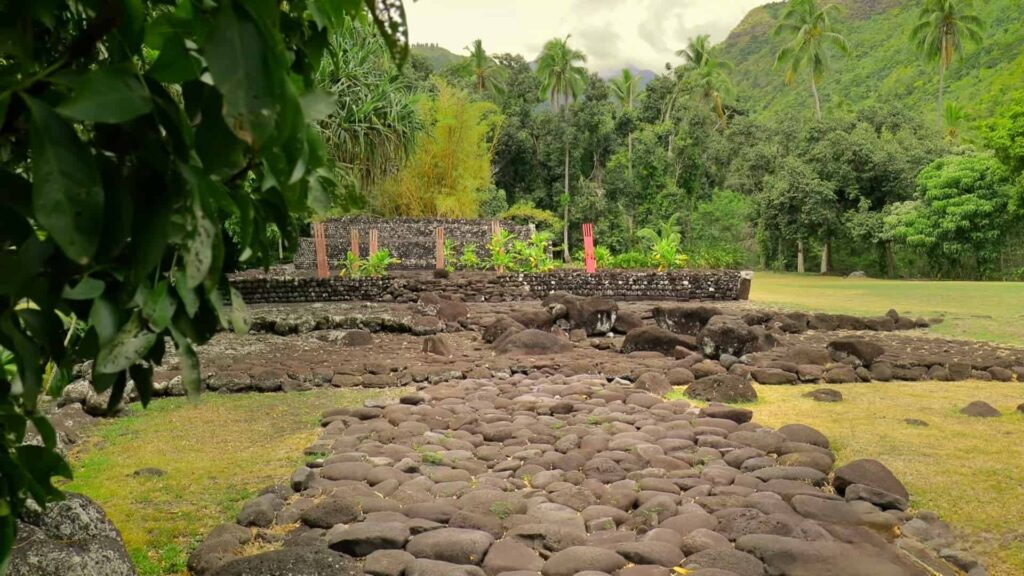
Requirements to live in Tahiti
- All travelers require a passport valid for at least 6 months, except for French nationals.
- To reside long-term in Tahiti, you must obtain a long-stay (LS) visa or work permit. The application process may vary by nationality.
- EU Citizens:
- They can stay visa-free for up to 3 months.
- For longer stays, proof of sufficient income and medical insurance is needed.
- Other Citizens:
- Nationals of other countries, with the exception of a few, need a visa for the length of their stay, typically limited to 3 months.
- Stays exceeding 3 months require an LS visa, which usually allows for a one-year stay.
- Residence/work permits are necessary for those intending to live or work in Tahiti.
In order to secure a work permit in Tahiti, you must first apply for a job locally. Additionally, employers are required to confirm that they’ve advertised the position locally for four weeks before considering foreigners.
So it’s not easy to get a work permit, let alone a residency permit. In the past, it was easier to get a work permit, but the French authorities have now tightened the rules.
Wrapping up the Living in Tahiti Guide
Living in Tahiti is like living on an island. You’re in the middle of the ocean, isolated from the rest of the world, living a different version of life.
There are beautiful sights and lots of fun activities to try on the island. You’re close to nature and have the world’s largest pool at your disposal.
But as I mentioned above, the French government has made it very difficult for foreigners to settle in French Polynesia. You can come here as a tourist but to call it your new home is like an unattainable dream.
I’ve covered nearly everything about life in Tahiti. After reading through the article, I’m sure you can make a well-informed decision.

Well done. Thanks
love it 🙂
Well informed way of life in Tahiti. Feels like that I have been there! Thank you for covering all aspects of the island. I would love to travel to Tahiti in future. Thanks.